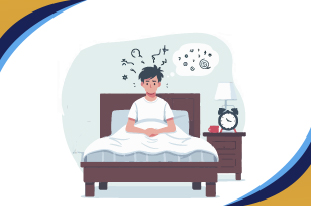Have you ever seen a person who reacts totally differently when confronted with an emotional situation?
Did you ever feel that?
If yes, you are escaping from emotions and set your mind to block that emotional state and convert it into a rational state.
You take refuge in facts, data, and logical reasoning, especially when dealing with emotionally charged situations.
To better understand, picture traumatic news, but instead of feeling sad, you start thinking about the situation analytically, and divert your mind towards cold, hard facts.
This is intellectualization, a defense system in our mind that controls us from emotional suffering.
This is a fascinating web of human psychology.
What Is Intellectualization?
Intellectualizing emotion is a common way that people use to deal with difficult situations. Rather than feeling sad, angry, or scared, people step back and look at the situation with logical reasoning and facts or even start planning about situations.
It is a mental barrier that helps the mind to avoid uncertain emotions by diverting attention towards details and data of the problem. They start finding out about the causes of that situation and planning.
This mechanism creates a difference between yourself and your feelings.
Read More: What is Endogenous Depression? Symptoms and Treatment
The Difference Between Intellectualization and Rationalization
There is a difference between intellectualization and rationalization. These two terms seem similar but are different.
Intellectualization
Intellectualizing meaning is looking at facts or emotions’ cause, but ignoring the emotional feel that comes with them. People use logic and data to keep feelings at a distance.
Rationalization
This is the opposite of intellectualization. You can say that when a person finds themselves in an inexplicable situation, they take support logical reasoning or make lame excuses, like when a child receives lower grades, he argues that my teacher hates me, and that’s why I score below average. This is a lame justification for your actions or feelings that are not entirely true. You use flawed logic to hide the real reason for your behavior from yourself.
How You Can Spot Intellectualizing
People who intellectualize often do it without realizing it. Especially men think they are being strong for not expressing their emotions. Here are some common examples of what intellectualization looks like in everyday life.

Work stress
You are flooded with your job tasks, but instead of admitting that you are stressed, you focus on organizing your to-do list and creating a new strategy to work with new terms.
Relationship problems
Your partner is angry with you, and instead of listening to their reasons, you calmly put forth your logical reasoning.
Grief
When you lose a loved one and are in extreme grief, but you set aside those emotions and set on a practical task about receiving the guests, funeral arrangements, and avoiding the pain of your loss.
Read More: The Vicious Cycle Of Generational Trauma And How It Affects Families
Trauma
After a traumatic event like an accident, you might talk about the timeline or say that “everything happens for some reason”. But you don’t talk about how the incident impacted your emotions and what made you feel.
Chronic illness
This can happen to a patient who is experiencing a chronic illness like Cancer, but rather than feeling fear, they focus on researching treatment plans and possibilities with doctors.
A breakup
After a breakup with your girlfriend, you start expressing all the reasons why being single is good and healthy instead of feeling hurt.
Common Signs to Look For
When you are wondering whether you or your loved one is intellectualizing in certain situations, you can find these signs:
Overthinking Things:
When you are stuck in a situation, you constantly analyze your feelings and think about them repeatedly, rather than feeling them.
Rationalize Your Emotions:
In emotional situations, you come up with logical reasons or excuses for your feelings instead of just accepting them for what they are.
Downplay Your Emotions:
You tell yourself that these are minor situations and not a big deal, and that you can “get over it”.
Read More: A Guide to Understand Anxious Attachment
Use Humor To Escape:
You make jokes about serious situations to avoid talking about how it makes you feel.
Problem Solver But Not At Emotional Talk:
You find yourself talking about complex topics with ease and handling difficult situations, but you struggle when someone asks you how you truly feel.
Ask “Why” Rather Than “How”:
You want to understand the situation, rather than the emotions that have been created in you.
Why Intellectualization Is Not a Good Long-Term Solution
Intellectualizing feelings is a temporary solution to come out of an intense or stressful situation. But this mechanism should not be applied in every situation. It is not a healthy way to deal with emotions over time. This style has many downsides.
You keep on suppressing your emotions rather than facing them. Over time, this can come out as a volcano and lead to anxiety, depression, or other mental health problems.
Next, your relationship suffers because you intellectualize emotions too much. True connection comes with emotional intimacy. When you intellectualize them, you look cold or distant, which makes it hard for others to come closer to you.
You suffer mentally and physically. When you suppress your emotions, it can lead to chronic stress, high blood pressure, and a weaker immune system.
You don’t learn about yourself and your feelings, like why is this happening? How to react in such situations? Am I intellectualizing? These are the questions that you need to ask about yourself.
Read More: Everything about Emotional Dysregulation in ADHD
How to Stop Intellectualizing and Start Feeling
The strategies that help to cope with intellectualizing emotions vs feeling them. This means learning healthier ways to cope. You can work with a professional and practice these strategies on your own.
Cognitive Behavioral Therapy (CBT)
This is a talk therapy session with a psychiatrist. This type of therapy helps you identify and change unhealthy thought patterns. It gives you a structured way to feel your emotions in a more balanced way.
Mindfulness
You can practice your mind like you do meditation, which helps you become more aware of your emotions without judging them. It teaches you to focus on the physical sensations and feelings in your body.
Psychodynamic Therapy
This therapy helps you explore your unconscious mind to understand where your emotional avoidance comes from.

Intellectualization in Therapy
In a therapy session, psychiatrists might create such situations where you have to discuss painful topics and events. A good therapist will recognize this and help you move beyond intellectualizing suffering.
They will help you connect with the physical feelings in your body and help you explore your true emotional feelings.
Read More: There’s Something About Disruptive Mood Dysregulation Disorder That You Should Know (DMDD)
Other Useful Self-Strategies
Write your emotions, how, what, and when you feel. This can help you connect with your emotions. Your writing without judgment for even 15 to 30 minutes can make a big difference.
Practice Self-Acceptance: This means accepting yourself as it is, including your messy self, imperfect feelings, etc. It helps you build a foundation for being more emotionally open.
Share it: When you share your feelings and emotions with a trusted person, you become strong emotionally. Start small and practice being open about uncomfortable feelings.
Seek Professional Help: A therapist can help you understand why you are intellectualizing your feelings. They can guide you towards a healthier way of processing your feelings.
Try Self-Care: Different activities like exercise, sitting in nature, and meditation can help you stay connected to your body and emotions.
Read More: Understanding The Fawn Trauma Response: What It Is And How It Impacts Us?
A Better Way Forward with us
Yes, your recognition of emotions and feelings is a key to your overall well-being. While intellectualizing looks like a useful tool in the moment, it stops your mental capabilities and full emotional life. It restricts one from developing a relationship.
At Orange Coast Psychiatry, We have professional psychiatrists who can recognize your state and draw important, helpful strategies to help you learn your emotions, rather than intellectualizing them. Call us and make an appointment with our professionals.
























